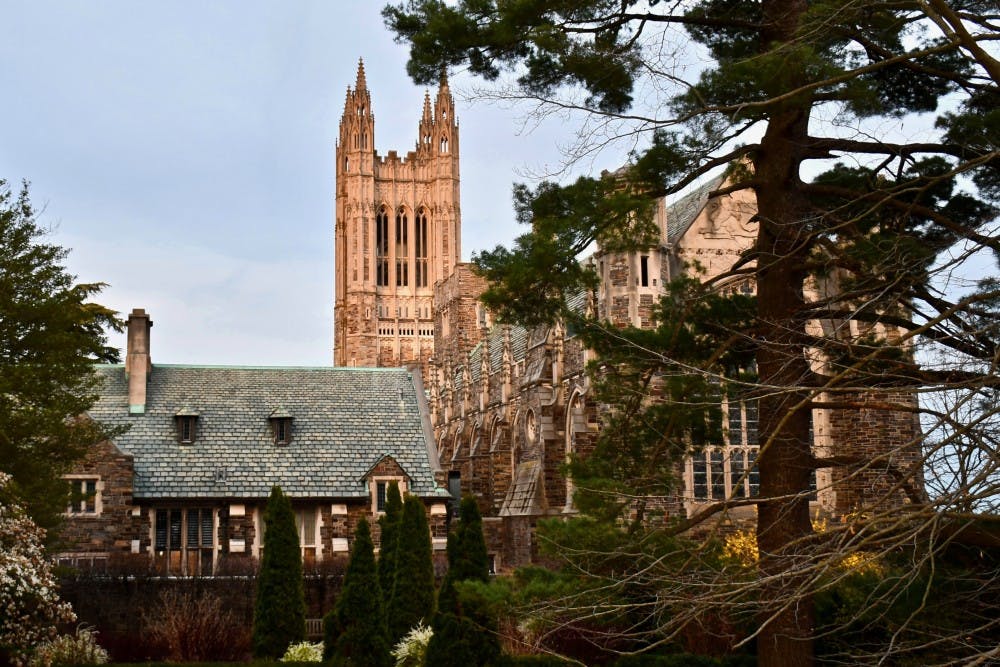A new study co-led by Professor of Philosophy Sarah-Jane Leslie GS ’07 discovered that in academic fields that place a strong emphasis on notions of “brilliance,” or latent intellectual talent, women were more likely to describe feeling like frauds relative to their male counterparts.
The study, titled “Women — Particularly Underrepresented Minority Women — and Early-Career Academics Feel Like Impostors in Fields that Value Brilliance,” found that women from underrepresented minority groups reported greater feelings of fraudulence, and graduate and postdoctoral students were more likely to echo these feelings relative to faculty members in their field.
Graduate students, postdoctoral students, medical residents, and faculty from 83 academic fields, a total of 4870 participants, filled out the questionnaires analyzed in this study. Questionnaires quantified reports of fraudulence, self-efficacy, and the sense of belonging experienced by participants in relation to their fields. The findings of this research, published in the Journal of Educational Psychology in August, bear relevance to contemporary concerns about gender disparities in achievement in academic fields that have struggled to reduce these enduring gaps.
Among the academics in fields surveyed, women pursuing careers in STEM, philosophy, and economics reported heightened feelings associated with imposter syndrome, a phenomenon in which individuals deem their accomplishments unworthy of success due to persistent feelings of fraudulence and a lack of self-confidence. This study sampled the particular experiences of individuals in these fields to determine if contextual factors, including rampant messaging that underscores “brilliance,” were related to reports of imposter syndrome and associated concerns.
Moreover, this study integrated an intersectional approach to the investigation of gender differences in imposter syndrome, factoring in race/ethnicity to obtain more representative results.
Consistent with findings from their previous research, the authors discerned a correlation between different academic disciplines’ perceived emphasis on “brilliance” and an increase in reported feelings of imposter syndrome among women relative to men. This trend held especially true for women considered underrepresented racial minorities.
The findings show how imposter syndrome emerges from the context of the academic environment as opposed to inherent psychological factors, suggesting that de-emphasizing “raw intellectual talent” could lower the number of individuals who exhibit feelings of imposter syndrome.
Dr. Leslie, who has extensively researched gender and racial gaps prevalent in academia, wrote in an email to The Daily Princetonian that she was surprised by the impact of beliefs regarding brilliance on feelings of fraudulence among women.

Reflecting on the implications of the research findings, Leslie added that academic fields that struggle to attract a more demographically diverse cohort of scholars should take note of the barriers that stand in the way of women and underrepresented minorities finding success.
“I think a first step is to acknowledge the phenomenon and, in particular, to acknowledge that ‘brilliance required’ messages have powerful and disparate effects on people,” wrote Leslie to the ‘Prince.’
“In earlier work, we found that girls as young as 6 years of age had internalized stereotypes associating brilliance with males more so than females,” she added.
“So, when members of an academic discipline communicate the idea that only brilliant people can succeed, these messages interact with decades of internalized stereotypes to produce imposter feelings and other such effects,” Leslie wrote. “Shifting the focus away from ‘brilliance' towards factors such as hard work, dedication and skill development is one relatively easy step that academics can take to foster more inclusive environments.”

As a student prospectively concentrating in mathematics, Maya Chande ’24 has firsthand experience with some of the vulnerabilities that arise when navigating a field where notions of inherent “brilliance” prevail.
“I am not sure I would go so far as feelings of fraudulence, but I have certainly experienced a lack of confidence in pursuing the major. Solving a problem for which one does not see an immediate path to a solution fundamentally requires a certain level of confidence in one's mathematical abilities — a confidence that I have noticed is more overtly prevalent in my male peers than female peers,” Chande said.
While Chande believes that the self-assuredness with which many of her peers approach mathematics isn’t inherently bad, observations of such intellectual confidence in some of her peers, most of whom identify as male, initially discouraged her.
“There is nothing inherently wrong with having this confidence — it is an incredibly valuable thing — but seeing the apparent ease with which some of my peers approached problems that I knew took me a lot of time and effort to think through, often led me to believe others had something I somehow didn't, that there exists some intrinsic intellectual talent that cannot be attained with mere hard work which separates good mathematicians from great ones,” Chande said.
“I am still not entirely sure to what extent this is true, but this notion made me quick to doubt my potential to become truly great at math and doubt the worth of pursuing math if this were the case,” she added.
Regardless of these concerns, Chande’s own reflections ultimately led her to conclude that mathematics, despite its challenges, still remains a fascinating and rewarding discipline that she genuinely enjoys studying.
With respect to improving the diversity of the graduate student body, the University has adopted several initiatives that aim to recruit students from underrepresented backgrounds and foster a sense of community among a diverse population of students, including the Grad Scholars Program, the Pre-Doctoral Fellowship Initiative, and the Princeton Prospective Ph.D. Review (P3).
“This is exciting because not only are we positively impacting students from underrepresented groups in our graduate admissions process but supporting the broader pipeline of prospective underrepresented graduate students,” Graduate Associate Dean for Access, Diversity, and Inclusion Renita Miller wrote to the ‘Prince.’
Programs that seek to expand outreach to historically underrepresented demographics of students and to prepare them academically align with some of Dr. Leslie’s proposed interventions centered on promoting greater diversity among students in different academic fields.
Notwithstanding such commendable initiatives, Chande noted that the Department of Mathematics benefits greatly from collaboration, openness, and vulnerability among students of varying skill levels and backgrounds.
“Doing math is similar to being lost in the woods. No one immediately knows the way home, but some will more easily admit that they are lost than others,” Chande said.
“A community that more openly acknowledges that they are lost when they are can help build solidarity among people of diverse backgrounds through the struggle of solving problems rather than building barriers of doubt through false pretenses. While certainly intimidating at first, the more I collaborated with my peers, the more I experienced this comradery and the resultant confidence that has made me a better mathematician since,” she added.
Amy Ciceu is a staff writer who often covers research and COVID-19-related developments. She also serves as a Newsletter Contributor and a senior writer for The Prospect. She can be reached at aciceu@princeton.edu.








